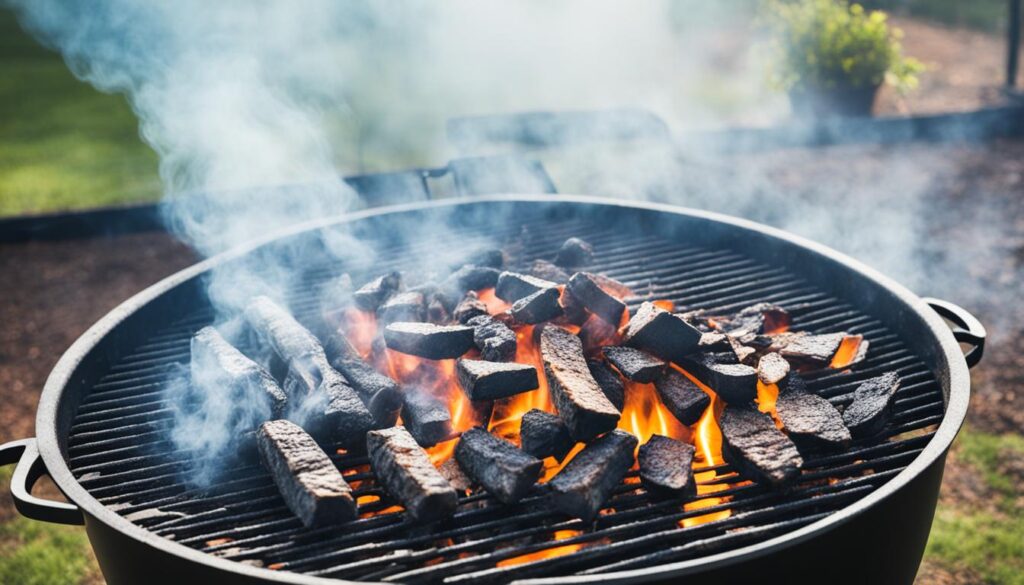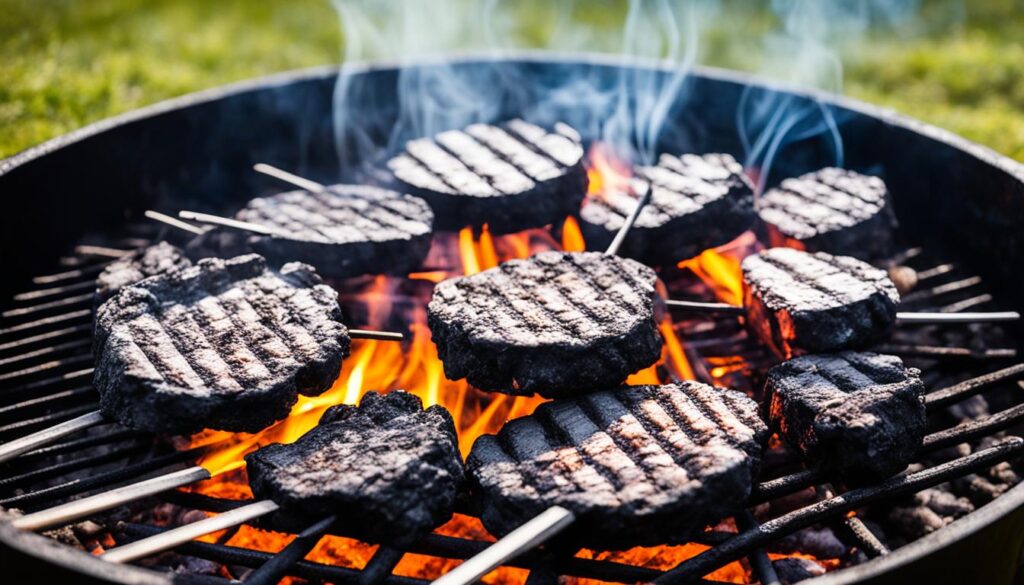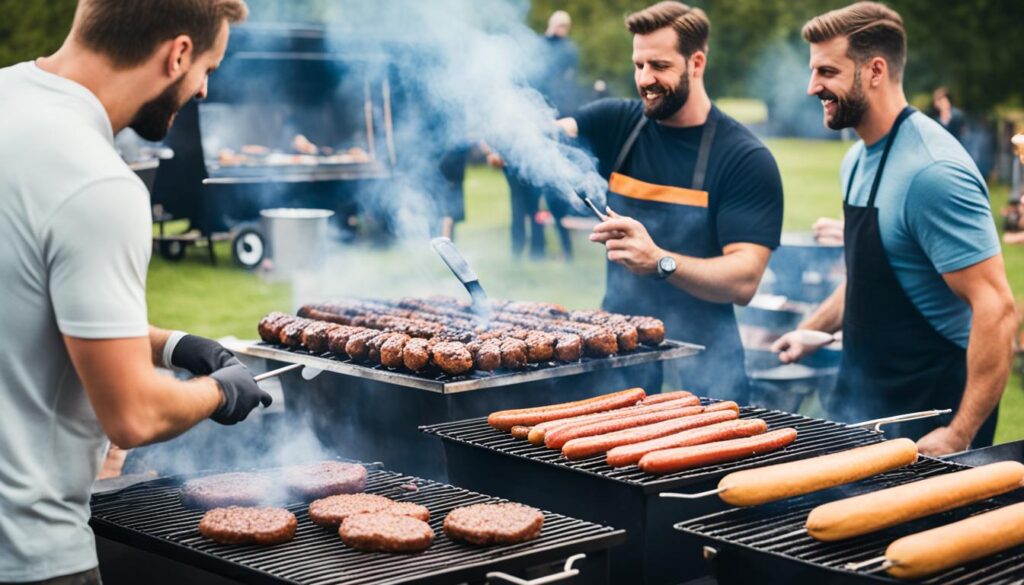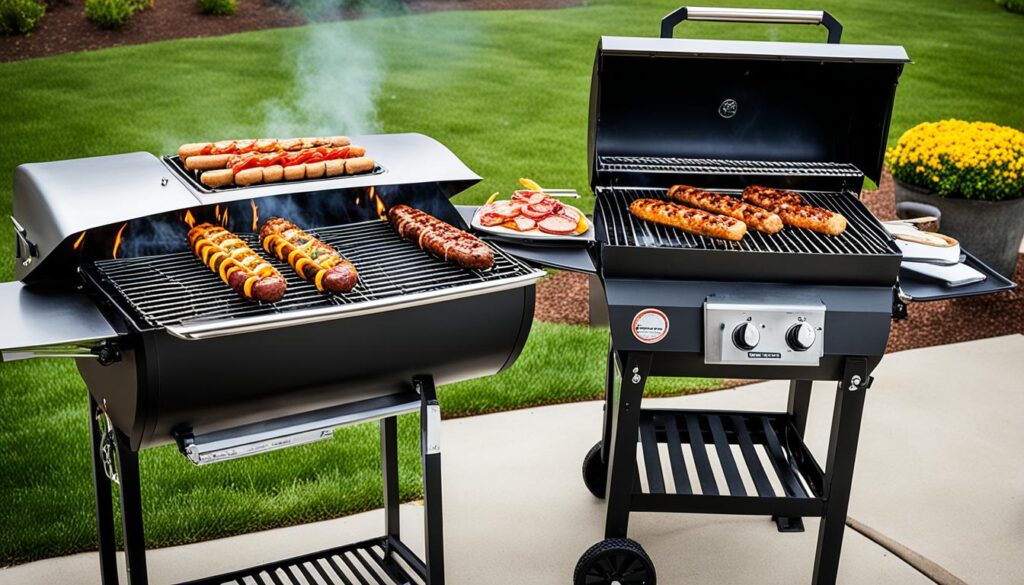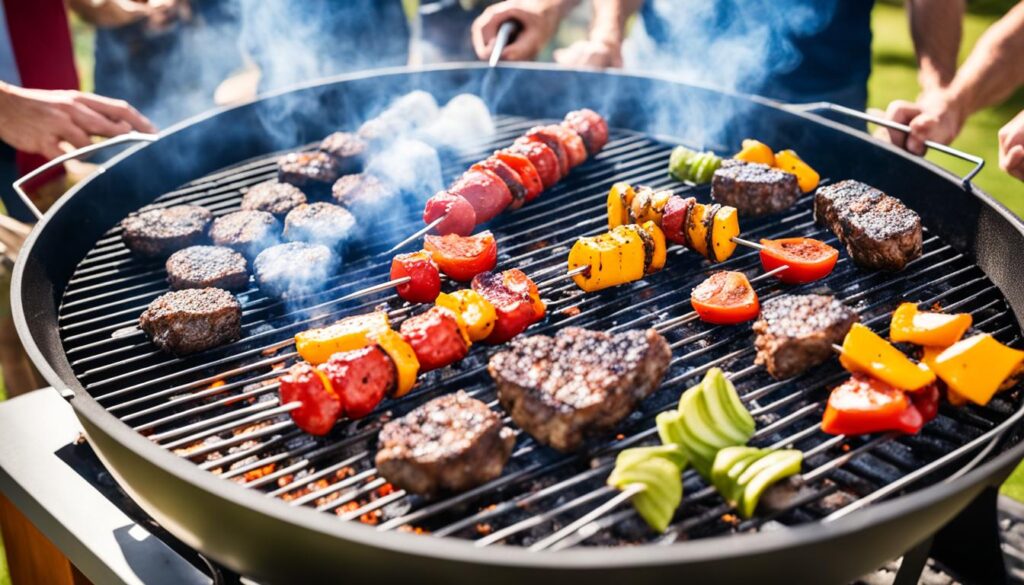As the cold winter months approach, many barbecue enthusiasts wonder if it’s safe to leave their BBQ outside. While it may be tempting to simply cover it with a tarp and leave it be, proper care and storage are crucial to protect your BBQ from the harsh winter elements. In this article, I will discuss the necessary steps to winterize your BBQ and ensure its longevity.
Key Takeaways:
- Properly store and winterize your BBQ to protect it from the harsh winter elements.
- Clean your BBQ thoroughly, inside and out, before storage.
- Invest in a high-quality BBQ cover to shield your BBQ from snow, rain, and other winter elements.
- Consider storing your BBQ indoors to provide the best protection during winter.
- Different types of BBQs may require slightly different winterizing steps.
Winter BBQ Preparation
Before storing your BBQ for the winter, it is important to prepare it properly. This ensures that your grill remains in top condition and is ready for use when warmer weather returns. Winterizing your outdoor grill involves a few key steps that will protect it from cold temperatures, moisture, and other winter elements.
- Clean the inside and outside: Start by cleaning both the inside and outside of your BBQ. Remove any excess food particles, grease, and debris. A thorough cleaning will prevent the buildup of mold or rust during the colder months.
- Scrub the grill grates: The grill grates should be scrubbed clean to remove any stubborn residue or food particles. This helps prevent them from sticking and prolongs their lifespan.
- Remove excess grease: Take the time to remove any excess grease from the BBQ. Grease can attract pests and may cause damage if left unattended.
- Cover your BBQ: Once your BBQ is cleaned and dried, it’s time to cover it. Investing in a high-quality winter BBQ cover is essential. A cover keeps your grill protected from snow, rain, and harsh winter conditions, extending its lifespan and preventing damage.
By following these winter BBQ preparation steps, you can ensure that your grill remains in excellent condition throughout the colder months. This will save you time and effort when it’s time to fire up the grill again in spring.
Cleaning Your BBQ
To ensure your BBQ is in perfect condition for storage, it is crucial to clean it thoroughly. This will help remove any built-up debris, food leftovers, and grease, preventing the formation of rust or mould during the winter months.
Start by cleaning the inside and outside of your BBQ. Use warm soapy water and a wire brush to scrub away any grime or residue that may have accumulated. Pay special attention to the grill grates, as they tend to collect a lot of grease and food particles.
Once the BBQ is clean, rinse it off with water to remove any soap residue. Make sure to dry it thoroughly to prevent any moisture from causing damage. You can use a clean cloth or let it air dry.

Remember to also remove any ash or charcoal remnants if you have a charcoal BBQ. This will prevent any odours and keep the interior clean.
By cleaning your BBQ thoroughly before storing it, you’ll ensure that it’s ready to use when the warmer weather returns. Plus, it will extend the lifespan of your BBQ, allowing you to enjoy delicious grilled meals for years to come.
Ideal Storage Options
When it comes to storing your BBQ during the cold winter months, it’s best to keep it indoors if possible. This provides the greatest protection from the harsh weather elements, ensuring that your BBQ stays in optimal condition. If storing the BBQ indoors is not an option, you can consider placing it in a garden shed or another covered area that offers some protection.
If your BBQ must be stored outside, there are still steps you can take to protect it. First and foremost, make sure to keep it sheltered from strong winds that can cause damage. Additionally, it is crucial to cover your BBQ with a waterproof BBQ cover. The cover acts as a barrier, preventing snow, rain, and other cold weather elements from reaching your BBQ and potentially causing damage.
To give you an idea of the ideal storage options, here are some recommendations:
- Store your BBQ indoors, such as in a garage or a storage room.
- If indoors is not possible, place your BBQ in a garden shed or another covered area.
- If your BBQ must stay outside, make sure it is sheltered from strong winds.
- Always cover your BBQ with a waterproof BBQ cover.
By following these storage recommendations, you can ensure that your BBQ stays protected during the cold weather, allowing it to be ready for use when the barbecue season returns.

Winterizing Different Types of BBQs
When it comes to winterizing your BBQ, it’s important to remember that different types of BBQs may require slightly different steps to ensure their protection during the colder months. Whether you own a charcoal BBQ or a gas BBQ, here are some key considerations for winter BBQ safety and protecting your BBQ in winter:
Charcoal BBQs
For charcoal BBQs, start by focusing on cleaning the cooking grill thoroughly. Remove any remaining ashes or debris from the grill to prevent rust or mold from forming. Once the grill is clean, consider using a high-quality BBQ cover to shield it from winter’s harsh elements. By paying attention to these steps, you can ensure that your charcoal BBQ remains in excellent condition until it’s time to fire it up again in the warmer months.
Gas BBQs
When it comes to winterizing a gas BBQ, it’s essential to go the extra mile to protect the various components. Begin by removing all cooking grids and burners and soaking them in soapy water. This will help remove any grease build-up and ensure that your gas BBQ is clean and ready for storage. After scrubbing the cooking grids and burners, ensure they are completely dry before reassembling the grill. Additionally, remember to turn off the propane tank and store it safely to avoid any potential hazards. By following these steps, you can protect your gas BBQ from the elements and ensure it’s ready to use when the warmer weather returns.
Benefits of an Outdoor Kitchen
When it comes to outdoor winter grilling, having an outdoor kitchen can be a game-changer. Not only does it allow you to enjoy the thrill of barbecuing in the colder months, but it also offers a range of benefits for winter BBQ safety. Let’s explore why an outdoor kitchen is a valuable addition to your home.

1. Extended Grilling Season
With an outdoor kitchen equipped with proper shelter, you can extend your grilling season all year round, even during the winter months. This means you don’t have to wait until the warmer weather arrives to savor the smoky flavors of winter BBQ.
2. Convenience and Comfort
An outdoor kitchen brings convenience and comfort right to your backyard. You don’t have to go back and forth between the indoor kitchen and the grill, allowing you to focus on the experience of outdoor winter grilling without any interruptions.
3. Versatility in Cooking
An outdoor kitchen offers a variety of cooking options beyond traditional grilling. You can incorporate features like smokers, pizza ovens, and side burners, providing you with endless possibilities for winter culinary delights.
4. Entertainment Space
An outdoor kitchen creates a fantastic entertainment space for winter gatherings. It becomes a focal point for hosting family and friends, allowing you to interact with your guests while preparing delicious meals on the grill.
5. Easy Cleaning and Maintenance
Keeping your outdoor kitchen clean and well-maintained is relatively easy. Regular cleaning and maintenance help ensure that your equipment stays in good working condition throughout the winter.
Remember, even with an outdoor kitchen, it’s essential to take steps to ensure winter BBQ safety. Thoroughly cleaning your BBQ and covering it when not in use are crucial practices to protect it from the winter elements.
Next, we’ll dive deeper into the process of protecting gas grills during the winter months to maintain their performance and longevity.
Protecting Gas Grills
When it comes to winterizing your gas grill, there are a few important steps you need to take to ensure its protection during the cold months.
First, make sure to shut off the gas at the LP tank and disconnect the gas lines. This will prevent any potential leaks or accidents while the grill is not in use.
Next, it’s time to give your grill a thorough cleaning. Remove any residue or food particles, both on the grates and inside the grill. Use warm soapy water and a wire brush to scrub away any stubborn grime.
To prevent rust and corrosion, it’s recommended to coat the burners and other metal parts of your grill with a thin layer of cooking oil. This will help repel moisture and keep your grill in better condition throughout the winter.
Lastly, protect your grill from the snow and other elements by covering it entirely, including the propane tank. A high-quality BBQ cover can provide an extra layer of defense against the harsh winter weather.
By following these steps, you can ensure that your gas grill stays protected and ready to use when the warmer months roll around again.
Taking Care of Small Parts
When it comes to winterizing your outdoor grill and storing your BBQ in cold weather, don’t forget about the small parts. These often overlooked components play a crucial role in the overall performance and longevity of your BBQ.
Firstly, I recommend taping a plastic bag securely over the gas line opening. This simple step helps prevent insects and critters from nesting in your BBQ during the winter months. Trust me, you don’t want to deal with an unexpected infestation when it’s time to fire up the grill again!
If your BBQ has an electric starter, it’s important to remove the battery before storing it for the winter. This helps prevent battery corrosion and extends the life of the starter. Simply unscrew the battery compartment, remove the battery, and store it in a safe and dry place.
Lastly, if you have any removable parts on your BBQ, such as cooking grates or drip pans, it’s best to store them indoors if you have the space. Storing these components indoors helps protect them from the harsh winter conditions and ensures they stay in great shape for the next grilling season.
By taking care of these small parts, you’ll be well on your way to properly winterizing your outdoor grill and storing your BBQ in cold weather. Remember, attention to detail goes a long way in maintaining the quality and performance of your beloved BBQ.
Covering Your BBQ
One of the most important steps in winterizing your BBQ is to cover it properly. A high-quality BBQ cover, specifically designed for your model, will protect your BBQ from the elements and extend its lifespan. Whether your BBQ is stored indoors or outdoors, covering it is essential.
When it comes to choosing the best winter BBQ cover, there are a few practices to keep in mind:
- Ensure the cover is made of durable and waterproof material. This will provide effective protection against rain, snow, and moisture.
- Choose a cover that fits your BBQ snugly. A properly fitted cover will provide maximum coverage and prevent any gaps that could allow water or pests to enter.
- Look for covers that have secure fastenings, such as drawstrings or buckles. These will help keep the cover in place, even during strong winds.
- Consider covers with additional features like UV protection or ventilation panels. These can help protect your BBQ from sun damage and prevent condensation buildup.
Remember, investing in a good quality winter BBQ cover is an investment in the longevity of your BBQ. It will protect your grill from rust, corrosion, and other damage that can occur during the colder months. Properly covering your BBQ is a simple yet effective practice that will ensure you can enjoy delicious grilled meals for years to come.
Storing the Propane Tank
When storing your BBQ outdoors during cold weather, it is important to take proper precautions to protect the propane tank. While keeping the tank connected, ensure that it is shut off. Additionally, cover the entire grill, including the tank, with a protective cover. This will shield your BBQ from the harsh winter elements and help maintain its functionality.
However, if you choose to store your grill indoors during the winter, it is essential to disconnect the propane tank. Store the tank upright outside in a safe location away from heat sources. This ensures proper ventilation and minimizes the risk of any gas leaks or accidents.
Remember, safety should always be a top priority when handling propane tanks. Following these storage guidelines will help safeguard your BBQ and ensure it is ready for use when the warmer weather returns.

